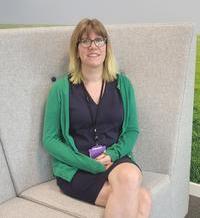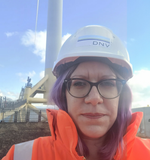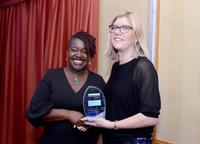Spotlight on Chartered Engineer: Jo-Anne Tomkins
IGEM Marketing Communications Co-ordinator Jordanne Allsopp continues our series of member case studies by talking to Jo-Anne Tomkins, Senior Principal Engineer at DNV and a Chartered Engineer.
As the momentum of the energy transition gains traction, safety in the natural gas network must remain a top priority.
At the forefront of safeguarding the network is Senior Principal Engineer Jo-Anne Tomkins, whose work at the global independent energy expert and assurance provider, DNV is primarily focused on ensuring the network is safe, practical, operable and cost-effective.

Jo-Anne's work at DNV has primarily revolved around safety assessments, documentation updates, and functional safety projects, initially centred on natural gas networks but now primarily focusing on hydrogen transition projects.
She is involved in multiple hydrogen initiatives and engages with key stakeholders, including the Health & Safety Executive (HSE) and the Department for Energy Security and Net Zero (DESNZ).
She said: “I’m hoping to continue working across these exciting projects, supporting industry to determine our future pathway. I still pinch myself some days that this is my job, varied, important and at times rewarding.”
Jo-Anne kickstarted her career over two decades ago by studying Chemical Engineering at Loughborough University.
Whilst studying, she did two industrial placements at AstraZeneca and Invista, which gave her a taste of working in the sector before joining Foster Wheeler as a Graduate Process Design Engineer.
In the role, Jo-Anne gained experience through the graduate rotation scheme, completed an industrial placement in the technical SHE team and worked on a variety of projects including pre-FEED studies and commissioning.
In 2013, she moved to DNV and became a Senior Engineer in the Risk Advisory team, where she was introduced to projects with key natural gas clients.
She then held the role of Principal Consultant role for six years before becoming a Senior Principal Consultant earlier this year.
Jo-Anne’s role also allows her to collaborate with other consultants, the gas distributions networks and work on multi-team projects.
She said: “A major highlight of my job is working with my colleagues and peers across the industry who have so much specialist knowledge and are all working to deliver a safe and efficient network. The willingness to share that knowledge and work together when opportunities arise is a true highlight.”
Jo-Anne particularly enjoys the opportunity to visit emerging hydrogen projects at the cutting edge of the energy transition, such as SGN’s H100 Fife and NGN’s Hydrogen Homes.

These projects, says Jo-Anne, are proof that it is an exciting time to work in the gas industry.
She said: “I believe that gas is part of the future solution due to the flexibility the system provides, particularly at times of high demand.
“It is difficult to replicate that, so looking at all the system transformation options: hydrogen (blended or 100 per cent), more biomethane, a change in demand profile for an increased electrification option, how is electrification supported, etc., will be key for the future.”
However, said Jo-Anne, the natural gas network faces a number of challenges, from ageing assets, to maintaining a competent workforce and external issues such as climate change.
“This is where IGEM can be instrumental, facilitating sharing of learning and updating standards where appropriate,” she added.
Becoming an IGEM member has given Jo-Anne the chance to work with colleagues from a diverse range of gas backgrounds.
She has found the networking opportunities afforded by her membership particularly useful, alongside having access to technical standards and the Hydrogen Knowledge Centre.
She said: “IGEM really has become a common thread through many of the projects I have been working on. It was important to me to be part of that and be in a better position to comment on the development and update of IGEM standards.”
Jo-Anne’s IGEM membership also put her on the path to Chartered Engineer status, which is something she’s aspired to attain since graduating at university.
She said: “It demonstrates that you have continued to gain a deeper depth of knowledge and understanding in your area of expertise. This also opens up opportunities to act as a mentor for junior colleagues.
“I’ve tried to pay that forward as a STEM ambassador, supporting numerous events, from careers fairs to workplace visits, to running essay competitions, or even just having a chat with someone.”

Jo-Anne now sits on the Loughborough University Chemical Engineering Industrial Advisory Board where she is working on ways to be more visible to students and encourage students to enter the gas industry.
So, what is her advice to some of the young people she hopes to inspire? “Ask questions, even ones that you think might be daft, because most people are thinking the same thing.
“Speak up when you can spot a problem, saying something might be the difference between something going missed or allowing an individual to raise their own concerns.
“Keep persisting as it might take a few attempts to be heard or understood and listen and learn as the industry is vast and there is a lot to take in.”
